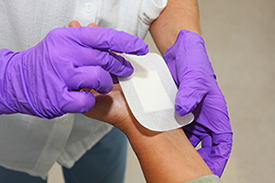Office of Research & Development |
 |
Office of Research & Development |
 |
December 2, 2019

Photo: ©iStock/choja
A study on MRSA infection in VA community living centers has led to revised VA prevention guidelines to combat the infection.
MRSA (methicillin-resistant Staphylococcus aureus) is an antibiotic-resistant bacterium. It is a common infection in health care settings. The bacteria are often transmitted through direct contact. Health care workers can carry the bacteria between patients, causing more infection.
Hospital workers are required to use precautions such as always wearing gloves and gowns to prevent the spread of MRSA. But in long-term care settings, these procedures can detract from a patient-centered, home-like environment.
Researchers studied how MRSA is transmitted in VA community living centers to determine what precautions may be most necessary. They found that health care workers’ gloves were more frequently contaminated than gowns when working with MRSA-positive patients. Transmission rates varied based on the type of activities workers were doing. Activities with a high risk of MRSA transmission included changing wound dressings, dressing residents, providing hygiene (brushing teeth, combing hair), and bathing residents. Low-risk activities included giving medications, testing blood glucose, and feeding.
The results allowed researchers to refine what precautions against MRSA need to be taken in VA community living centers. The findings were included in the VHA MRSA Prevention Initiative guidelines and shared with the VA Multidrug Resistant Organism Prevention Program. They also informed guidance from the Centers for Disease Control and Prevention for community-based nursing homes nationwide.
Principal investigator: Dr. Mary-Clair Roghmann; VA Maryland Health Care System
Selected publications:
Transmission of methicillin-resistant Staphylococcus aureus to health care worker gowns and gloves during care of residents in Veterans Affairs nursing homes. Pineles L, Morgan DJ, Lydecker A, Johnson JK, Sorkin JD, Langenberg P, Blanco N, Lesse A, Sellick J, Gupta K, Leykum L, Cadena J, Lepcha N, Roghmann MC. American Journal of Infection Control. 2017 Sep 1;45(9):947-953.
Transmission of resistant gram-negative bacteria to health care workers gowns and gloves during care of nursing home residents in Veterans Affairs community living centers. Blanco N, Pineles L, Lydecker AD, Johnson K, Sorkin JD, Morgan DJ, Roghmann MC. Antimicrobial Agents and Chemotherapy. 2017 Sept 22;61(10):pii:e00790-17.
Clostridium difficile colonization of nursing home residents. Roghmann MC, Andronescu L, Stucke E, Johnson JK. Infection Control & Hospital Epidemiology. 2017 Oct;38(10):1267-1268.